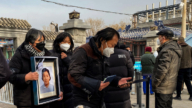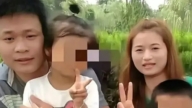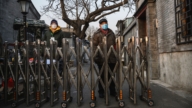【新唐人2013年11月18日訊】中共當局最近宣佈,將放鬆備受爭議的強制「計劃生育」政策,允許中國更多夫婦生育第二胎。外界分析,當局這次在人口政策上做出讓步,很可能是因為面臨越來越嚴重的「人口老齡化」和「勞動力緊缺」問題。但實際上,中共推行的強制墮胎、強制絕育等措施,嚴重侵犯婦女兒童的權益,本身就不該存在。
11月15號,大陸官方媒體刊登了中共十八屆三中全會的決定,其中涉及當局已經強制推行30多年的所謂「計劃生育」政策。
三中全會的決定宣稱﹕堅持計劃生育的基本國策,但將啟動實施夫婦有一方是獨生子女,可生育兩個孩子的政策。在此之前的政策則規定,除了少數民族和部分農村婦女之外,只有夫妻雙方都是獨生子女的才可以生育二胎。
對此,中國婦權創始人張菁對《新唐人》表示,當局的這次微調,表面看起來似乎是一種進步,但實際上並沒有涉及到根本的問題,比如「強制墮胎」等侵犯人權的行為。
中國婦權創始人 張菁:「中國30幾年的計劃生育政策本身一直備受爭議的主要是它的人權問題。它嚴重的踐踏了人權和婦女的權益,以及孩子的權益。實際上就是一個殺人的政策。」
《美國之音》中文網報導,美國眾議院人權小組委員會主席克里斯.史密斯,也對這一調整表示嚴重質疑。史密斯強調,政府仍牢牢掌控著誰能生孩子、生幾個孩子的決定權。在中共當局停止強制墮胎等一切恐嚇手段之前,他們的人口政策依然是全世界最令人毛骨悚然的政策。
中國從1980年開始實施的「獨生子女政策」帶來很多社會問題,其中包括:「強制婦女墮胎」、「絕育」等對人權的嚴重侵犯。但中共十八屆三中全會的這一決定絲毫沒有觸及這一問題。
中國青年政治學院教師 楊支柱:「它把這個計劃生育許可制度和強制的措施沒有任何的觸動,只是在這個指標上面稍微放寬了一點。所以這意味著計劃生育侵犯人權的事,會減少一點,但是仍然會大量存在。」
美國《華爾街日報》中文網也援引人口學家的話說,實際上「獨生子女政策應該整個取消。」
張菁:「生育權利是天生的、是神給的。這不是誰、不是中國共產黨給的。這個跟他們都沒有關係,這是天賦人權。可是呢這種人權都被共產黨控制了這麼多年。」
張菁談到,中國的問題並不是像當局所說的,人口太多,多到容不下了。實際上根本問題是:人口分佈不均勻。
張菁分析,中國西部很多地方非常貧瘠、荒無人煙,大部分人口集中在東部、沿海,但即使是人口再密集,也沒有像日本、香港那麼密集。所以這實際上是一個政策問題,並不是中國人太多。
張菁:「政策不好、在這片土地上沒有均衡的去發展,你重了一邊,而輕了另一邊。當然這個就要傾斜。」
外媒分析報導,中共放寬「一胎化政策」,並不是出於尊重基本人權的考慮,而是試圖藉此解決日益嚴重的人口老齡化和勞動力緊缺缺問題,以維持經濟發展和共產黨自身的統治地位。
但根據聯合國(United Nations)的預測,從2010年到2030年,中國的勞動適齡人口將減少6,700萬。而人口專家估計,這次調整只能使未來3年出生的嬰兒數量,增加100萬到200萬,相比之下遠遠不成比例。因此外界預測,這種調整並不能解決中國社會的人口老齡化和勞動力短缺問題。
採訪/朱智善 編輯/李謙 後製/李智遠
China One Child Policy Eases Amidst Continuing Coercion Measures
Chinese authorities agree to relax the controversial
and mandatory one-child policy, which will allow
more Chinese couples to have a second child.
The decision is believed to be a responding to
an aging population, and labor demand in China.
However, it does not address the fundamental
violation of the rights of women and children,
such as forced abortion and forced sterilization.
On November 15, the Chinese Communist Party (CCP)
announced further decisions of the Third Plenary Session.
It has agreed to address the mandatory one-child
policy that has remained in place for the past 30 years.
It stated that couples will be able to have
two children if one spouse is an only child.
In the past three decades, ethnic minorities and
some rural women were considered exempt.
Couples who were both only children
are also allowed to have two children.
Women’s Rights in China founder Zhang Jing indicates
this policy adjustment seems on the surface to be progress.
However, it does not touch on the fundamental issues
of human rights violations, such as the forced abortion.
Zhang Jing: “China’s family planning policy
has been controversial for more than three
decades, because of human rights issues.
It is a serious violation of human rights, women’s
rights, and children’s rights. It is a policy of murder.”
A report by Chinese Voice of America quoted
the views of Congressman Chris Smith.
Congressman Chris Smith is Chairman of the House
for the Human Rights Subcommittee and also co-chair
of the Congressional-Executive Commission on China.
He emphasized that, left unchanged, this policy is the
Chinese regimes strangle-hold on deciding who can
have children, and how many children a family can have.
He said that until the Chinese regime abolishes
all coercion in their population control program,
all the use of forced abortion and its program will
still continue as the most draconian in the world.
Since the one-child policy was implemented in China in
1980, it has brought numerous violations of human rights.
This includes forced abortion and sterilization. The
Third Plenary work report did not address these issues.
Yang Zhizhu, political science professor, China
Youth University: “It does not touch on the issues
of birth permits, nor it’s enforcement measures.
With a little revision on the exempt category, it only
releases the human rights violations of certain people.
Oerall, these violations still exists in a large scale.”
The Wall Street Journal (WSJ) reported a quoted from a
demographer, that “the entire policy should abolished.”
Zhang Jing: “Giving birth is an innate
and God given right, not the CCP’s right.
It has nothing to do with the CCP. We are entitled to it.
The CCP has controlled human right for so many years.”
Zhang Jing explains that over population is never the issue
in China. The issue is uneven distribution of the population.
Zhang Jing analyses, there are many barren
and uninhabited places in western China.
The majority of the population is
located in the eastern coastal regions.
However, the density is not as high as Japan or Hong Kong.
The problem is the policy, and not one of over-population.
Zhang Jing: “The bad policy had resulted
in an imbalance in land development.
Of course, the population will shift from one side to the other.”
Foreign media analyzed that rather than out of respect
for fundamental human rights, the ease of the one-child
policy is simply to sustain economic development.
It aims to tackle on the aging population and labor shortages.
According to United Nations projections, China’s labor force
is expected to lose 67 million workers from 2010 to 2030.
WSJ reported that population experts estimate children
are expected to be born as a result of the policy shift.
This will add 1 million to 2 million births over the next
three years, but this is too late to solve the problem
of an aging population and shortages in labor.



























